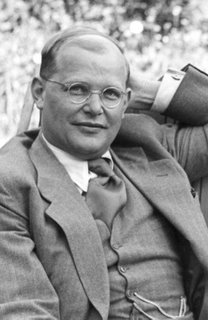 The Confessing Church: When the Nazis were consolidating their power in Germany during the 1930s, one of the areas they exercised significant control over was the German State Church (Lutheranism). Various Protestant theologians, including Dietrich Bonhoeffer (pictured above) and Karl Barth, decided to resist the encroaching Nazi influence. Common forms of resistance entailed underground assemblies in order to espouse anti-Nazi rhetoric as well as the active hiding of many Jews from the horrors of the concentration camps. This underground resistance movement on behalf of German pastors and theologians became known as The Confessing Church. Its founding document was the Barmen Declaration, which rejected Nazism as not being in line with Christian doctrine. Unfortunately, many leaders of this underground movement, including Bonhoeffer himself, were sent to concentration camps and later executed for their "treasonous" undertakings. His 1937 book The Cost of Discipleship served as a testament to the degree in which Bonhoeffer held the Grace of God above all else. In the end, Bonhoeffer drew heavily upon Scripture as his source of Faith because the situation in Nazi Germany proved ghastly by all accounts of Christian morality.
The Confessing Church: When the Nazis were consolidating their power in Germany during the 1930s, one of the areas they exercised significant control over was the German State Church (Lutheranism). Various Protestant theologians, including Dietrich Bonhoeffer (pictured above) and Karl Barth, decided to resist the encroaching Nazi influence. Common forms of resistance entailed underground assemblies in order to espouse anti-Nazi rhetoric as well as the active hiding of many Jews from the horrors of the concentration camps. This underground resistance movement on behalf of German pastors and theologians became known as The Confessing Church. Its founding document was the Barmen Declaration, which rejected Nazism as not being in line with Christian doctrine. Unfortunately, many leaders of this underground movement, including Bonhoeffer himself, were sent to concentration camps and later executed for their "treasonous" undertakings. His 1937 book The Cost of Discipleship served as a testament to the degree in which Bonhoeffer held the Grace of God above all else. In the end, Bonhoeffer drew heavily upon Scripture as his source of Faith because the situation in Nazi Germany proved ghastly by all accounts of Christian morality.
Thursday, November 16, 2006
The Confessing Church
 The Confessing Church: When the Nazis were consolidating their power in Germany during the 1930s, one of the areas they exercised significant control over was the German State Church (Lutheranism). Various Protestant theologians, including Dietrich Bonhoeffer (pictured above) and Karl Barth, decided to resist the encroaching Nazi influence. Common forms of resistance entailed underground assemblies in order to espouse anti-Nazi rhetoric as well as the active hiding of many Jews from the horrors of the concentration camps. This underground resistance movement on behalf of German pastors and theologians became known as The Confessing Church. Its founding document was the Barmen Declaration, which rejected Nazism as not being in line with Christian doctrine. Unfortunately, many leaders of this underground movement, including Bonhoeffer himself, were sent to concentration camps and later executed for their "treasonous" undertakings. His 1937 book The Cost of Discipleship served as a testament to the degree in which Bonhoeffer held the Grace of God above all else. In the end, Bonhoeffer drew heavily upon Scripture as his source of Faith because the situation in Nazi Germany proved ghastly by all accounts of Christian morality.
The Confessing Church: When the Nazis were consolidating their power in Germany during the 1930s, one of the areas they exercised significant control over was the German State Church (Lutheranism). Various Protestant theologians, including Dietrich Bonhoeffer (pictured above) and Karl Barth, decided to resist the encroaching Nazi influence. Common forms of resistance entailed underground assemblies in order to espouse anti-Nazi rhetoric as well as the active hiding of many Jews from the horrors of the concentration camps. This underground resistance movement on behalf of German pastors and theologians became known as The Confessing Church. Its founding document was the Barmen Declaration, which rejected Nazism as not being in line with Christian doctrine. Unfortunately, many leaders of this underground movement, including Bonhoeffer himself, were sent to concentration camps and later executed for their "treasonous" undertakings. His 1937 book The Cost of Discipleship served as a testament to the degree in which Bonhoeffer held the Grace of God above all else. In the end, Bonhoeffer drew heavily upon Scripture as his source of Faith because the situation in Nazi Germany proved ghastly by all accounts of Christian morality.
Subscribe to:
Post Comments (Atom)
No comments:
Post a Comment